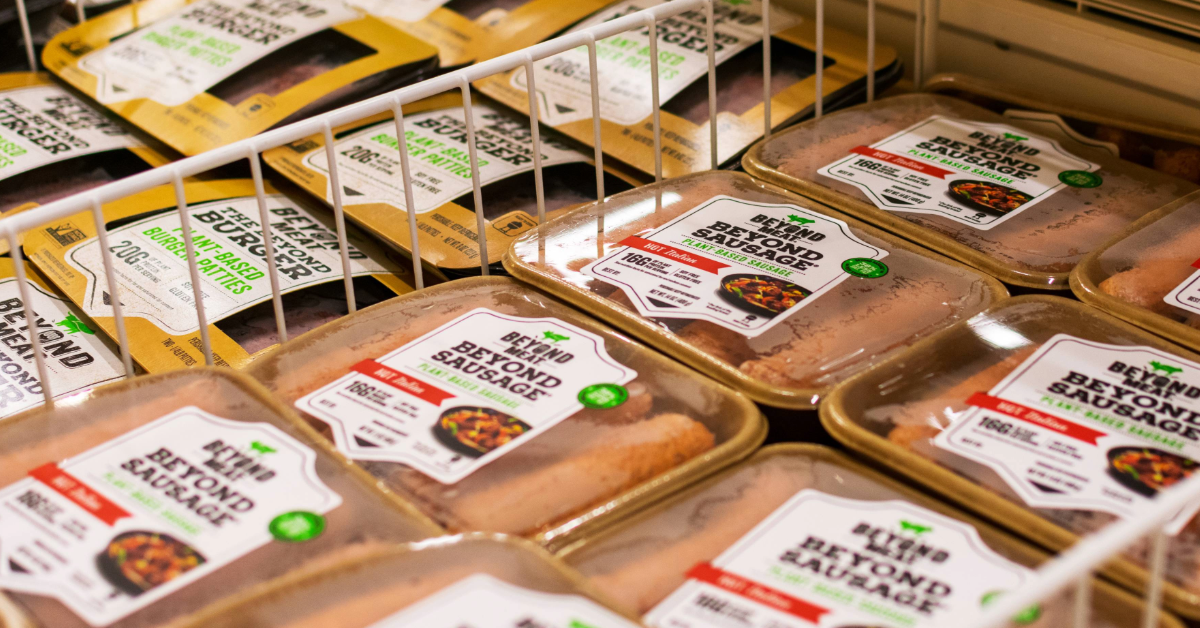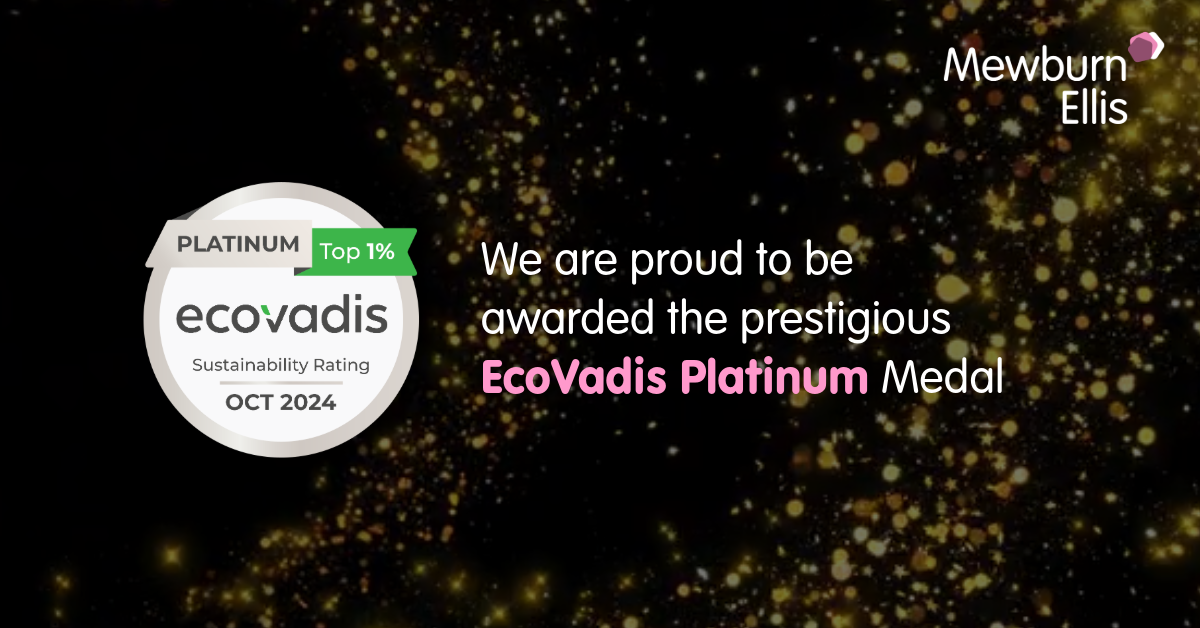
As Veganuary comes to a close, we are preparing to return to our normal lives and, indeed, diets. Already in this series, we have explored the technology behind novel plant-based and slaughter-free proteins, and how they are heralding a kinder and more sustainable future of food. Whilst this vision is getting closer by the day, many are not content with simply waiting for change to arrive. In the meantime, our Sustainability Team offers some practical tips on how we can take action today, to reduce our impact, and eat more sustainably.
If we are trying to reduce our car use, limit the amount of water we waste, become more ‘energy-efficient’ and generally lessen our environmental impact, we must also examine the most important factor of our personal ecological footprint.
WHAT WE EAT is one of the biggest contributors to our individual carbon footprint and reducing our intake of meat and animal products can ease our diet’s burden on the planet. Perhaps this is why Veganuary has become a popular choice for many people often looking to experiment with ways to reduce their environmental impact. In fact, a study from Oxford University identified going vegan as the “single biggest way” we can reduce our carbon footprint, shrinking it up to 73%. In a nutshell, every piece of food we eat has an impact on the environment, but some foods have much more of an impact than others. These include impacts on natural resources, like fresh water and land, and generation of massive amounts of waste and pollution.
It can sometimes feel overwhelming trying to balance all of this with getting dinner on the table, so here we provide 5 easy tips for eating sustainably:
1. Reduce meat intake
The worldwide phase out of animal agriculture, combined with a global switch to a plant-based diet, would effectively halt the increase of atmospheric greenhouse gases for 30 years and give humanity more time to end its reliance on fossil fuels, according to a new study by scientists from Stanford University.
About 40 percent of greenhouse gases come from agriculture, deforestation, and other land-use changes. Meat—particularly beef—drives climate change in two ways: first, through cows' emission of methane, a potent greenhouse gas, and second, by destroying forests as they are converted to grazing land.
If every family in the UK removed the meat from just one meal a week, it would have the same environmental impact as taking 16 million cars off the road1.
Reducing meat also saves water. Did you know, it takes 2,500 gallons of water to produce only one pound of beef? That is a HUGE amount of water for just ONE burger. If you eat one burger a week, that's 120,000 gallons of water in just one year.
2. Consider food miles
Food miles is a term that we have all become familiar with. It refers to the distance travelled by the food we eat. It is an important factor to consider when calculating the total emissions of producing food and is one of the reasons that we are told “eating local” is good for the environment. Whilst this is true for products with a short shelf-life, such as berries, asparagus and green beans, which are often flown into the UK out of season, food miles are actually only a small contributor to the emissions of most foods.
Perhaps surprisingly, transport only accounts for about 10% of the total emissions of most foods, and for the biggest emitters, such as beef, this number can be as low as 0.5%.
This means that foods grown in other countries that have a longer shelf life and are shipped into the UK, can have a lower carbon footprint than locally produced products. Locally produced meat will still have a much higher carbon footprint than most other foods.
Take home message: it’s important to focus on what you are eating as much as where in the world it was produced.
3. Eat seasonal products
What is seasonal food?
A fruit or vegetable is ‘in season’ when it is ripe and is harvested during a specific period of the year. The duration of a season will vary year-on-year due to multiple factors such as the weather.
It is not just about fruit and veg - meat and fish have seasons too! For instance, lambs are born at specific times of the year, meaning they reach maturation 4-6 months later.
Eating seasonally is nothing new — it is something that we used to do without any given conscious thought. Large scale, yield-driven farms, increased import of exotic foods, and diminished home-cooking from scratch have all contributed to our loss of appreciation of food’s seasonality.
By shifting our diet to once again reflect the seasons, we can reduce the pressure the food system places on the environment. For example, eating seasonally can contribute to:
- Reducing energy input: food grown in heated greenhouses out of season uses more energy.
- Reducing packaging: supply chains are often shorter, meaning produce can get to the consumer quickly and therefore requires less protection from spoiling.
- Supporting local farmers: by buying what is grown and produced locally, such as from your local farmers market, you are therefore helping sustain the local economy.
- Supporting organic farming methods: food grown on local, small-scale farms is often grown organically. Replacement of harmful chemicals and artificial fertilisers with organic matter helps to reduce soil erosion, improves biodiversity, and builds natural fertility.
Overall, eating seasonally leads to a reduction of negative environmental impacts in the food chain, and is therefore a sustainable solution.
So, how can you start eating more seasonably when almost everything is available year round in the supermarket? Check out these useful resources which provide information on seasonable produce and where to find it:
- Seasonal food calendar: http://eattheseasons.co.uk/
- Find your nearest market: https://www.lfm.org.uk/
- Sign up to a local veg box scheme, such as farmdrop: https://www.farmdrop.com/london
4. Reduce your food waste
It is estimated that a third of all food produced in the world is wasted. This adds up to about 1.3 billion tons of fruit, vegetables, meat, dairy, seafood and grains. Wastage occurs at all stages of the food production process, with a large proportion wasted in private homes. This means we can all do our bit to reduce food waste. A few ideas to do this include:
- Don’t throw away food just because it is past it’s best before date – many foods will remain perfectly edible long after this date (although care must be taken with meat and dairy products)
- Plan ahead
- Use your freezer
- Be creative with leftovers
- Use every part of vegetables
- If you eat meat, think about using “the whole animal”, for example by eating unusual cuts
- Use imperfect/over ripe fruit and veg in soups, sauces, smoothies
- Support companies like ‘imperfect foods’ and Oddbox. Many supermarkets also sell ‘wonky’ fruit or veg
- You can find more ideas here: https://lovefoodhatewaste.com/
5. Mindful fish eating
While fishing has a lower carbon footprint per kg than other protein sources such as red meat, the fraction of global fish stocks within biologically sustainable levels is decreasing2. In the UK, the most widely eaten fish are the “big 5”; cod, haddock, salmon, tuna and prawns, and it is these which are most at risk.
If you eat fish, choosing other, less common options such as sardines, hake or line-caught mackerel will help allow natural stocks of the big 5 time to recover.
You can also check out resources such as the Marine Conservation Society “Good fish Guide” for more info.
Farmed fish can also be unsustainable, for example farmed salmon is reliant on fish feed (e.g. anchovies, which could instead be eaten by humans directly) and often uses large quantities of antibiotics. Choosing to eat shellfish such as oysters, mussels and clams can be a more sustainable option.
References
- Joseph Poore, Oxford University
- FAO; Food and Agriculture Organization of the United Nations
About the authors
This article was written by Fay Allen, Lillian Cunliffe, and Sarah Harvey.
|
|
Fay Allen
Fay is a trainee patent attorney in our life sciences team. She has an undergraduate BSc degree in Biochemistry from the University of Bristol and a PhD in Biological Sciences from the University of Cambridge. During her undergraduate degree, Fay undertook a one year industry research placement in synthetic biochemistry, developing alternative protein expression systems in bacteria. Her doctoral research focused on mitochondrial dysfunction, particularly mitochondrial metabolism during ischaemia-reperfusion injury and heart transplant. Fay joined Mewburn Ellis LLP in 2019.
Email: fay.allen@mewburn.com
|
|
Lillian Cunliffe
Lillian’s role is to provide strategic HR management advice and guidance to optimise organisational performance as well as shaping and project managing delivery of major functional, cultural and organisational change.
Email: lillian.cunliffe@mewburn.com
Sarah is an associate patent attorney working as part of our life sciences team. She has a degree in Biological Sciences from Oxford University. She completed her PhD at Warwick University in plant pathology looking at how pathogen effectors manipulate the plant immune response. Sarah then worked as a post-doc in the Centre for Novel Agricultural Products at York University on plant responses to biotic stress.
Email: sarah.harvey@mewburn.com
Sign up to our newsletter: Forward - news, insights and features
Our people
Our IP specialists work at all stage of the IP life cycle and provide strategic advice about patent, trade mark and registered designs, as well as any IP-related disputes and legal and commercial requirements.
Our peopleContact Us
We have an easily-accessible office in central London, as well as a number of regional offices throughout the UK and an office in Munich, Germany. We’d love to hear from you, so please get in touch.
Get in touch



